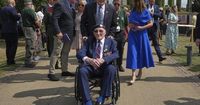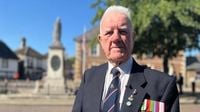The United Kingdom marked the 80th anniversary of VJ Day—Victory over Japan Day—with a series of poignant ceremonies and commemorations across the country, uniting veterans, royals, and communities in a collective act of remembrance. The events, held on August 15 and 16, 2025, cast a spotlight on the sacrifices of those who served in the often-overlooked Far East and Pacific theaters of World War II, as well as the enduring legacy of the so-called "forgotten Army."
At the heart of the national remembrance was a deeply emotional service at the National Memorial Arboretum in Staffordshire, attended by King Charles III and Queen Camilla. The royal couple, visibly moved, joined 33 veterans who had fought in the Pacific and Indian Ocean territories. The ceremony, which drew 1,500 guests, featured two flypasts, a two-minute silence, and stirring musical tributes. According to The Mirror, the highlight came when Captain Yavar Abbas, a veteran of the 11th Sikh Regiment, broke from his prepared remarks to salute the King and Queen for their presence and support, especially in light of the King's ongoing cancer treatment.
“Apologies for briefly going off the script to salute my brave King,” Abbas said. “Who is here with his beloved Queen in spite of the fact that he is undergoing treatment for cancer. I salute him for attending this occasion. By his presence here he has gone a long way to make sure that his Grandad’s 14th army is never given the sobriquet of the forgotten army.” His words, met with applause, left Queen Camilla with tears in her eyes and the King visibly emotional. As The Mirror reported, the two exchanged a heartfelt conversation, with Abbas later sharing that the King told him, “I almost cried.”
The ceremony paid tribute not just to those who survived, but also to those who never returned. Testimonies from former prisoners of war recounted the harrowing ordeals faced at the hands of the Japanese army, underscoring the immense cost of the conflict in the East. The event closed with a stirring flypast by the Battle of Britain Memorial Flight and a performance by violinist Jennifer Pike MBE, as guests reflected on the sacrifices made during the final, brutal months of World War II.
Elsewhere in the country, local communities found their own ways to honor the anniversary. In Clevedon, North Somerset, the seaside town transformed into a living tableau of the 1940s, complete with restored military vehicles, era-appropriate music, and period attire. According to BBC Somerset, the event was staged on the site of the old railway station—once a departure point for many who went off to war. For James Shopland, whose family business maintains a collection of vintage military vehicles, the occasion was about more than nostalgia. “The veterans are disappearing now and their legacies really are these vehicles,” he told the BBC. “For me it’s taking a piece of the past and trying to bring it back to life and also learn about what happened.”
Shopland’s father, David, who was a teenager on VJ Day in 1945, recalled that the mood at the end of the war in the Far East was far more subdued than the jubilant celebrations that greeted VE Day (Victory in Europe Day) on May 8, 1945. “It was more or less a forgotten army at times,” David Shopland said. “It wasn't a jolly occasion, it was tinged with sadness and a little apprehension about the future because the government had changed.” The family’s participation in the commemoration, he stressed, was about honoring what the vehicles and their history represent, not simply "playing soldiers."
The sense of being overlooked was echoed by Wally Newman, a 99-year-old Royal Navy veteran who attended a flag-raising and remembrance ceremony in Whittlesey, Cambridgeshire. Newman, who left home to serve in 1943 and did not return until 1947, described the disappointment he and his crewmates felt when, after Germany’s surrender on May 8, 1945, they were sent to the Far East rather than home. “We thought we were going home, but it didn't happen. We went out to the Far East. But you have to go where you're told,” Newman told BBC Cambridgeshire. The fighting in the Pacific continued for three more months, culminating in Japan’s surrender on August 15, 1945—VJ Day.
Yet, even after the official end of hostilities, Newman and many others were tasked with dangerous minesweeping operations that lasted two more years. “Even when the war was over in 1945, it wasn't over for us,” he said. “We still had to go out minesweeping, and that took another couple of years. It was very dangerous, obviously. But the point is that the mines are there and they've got to be swept.”
Newman also recounted his role in the restoration of British rule in Singapore in September 1945, an operation led by Lord Louis Mountbatten. “That was quite thrilling. I think the main thing was that we were all going to meet Lord Mountbatten because he was in charge,” he recalled. Despite the hardships—“fighting disease and the elements”—Newman looked back on his service with a sense of pride and camaraderie. “I really liked being in the Royal Navy and I think most sailors did,” he said. “I have memories I'll never forget.”
For decades, families and veterans have campaigned for those who fought in the Far East to receive the same recognition as their counterparts in Europe. As noted by The Mirror, the anniversary events this year sought to address that imbalance, with prominent figures—including the Prime Minister, Admiral Sir Antony Radakin, and Vice Admiral Paul Bennett—joining the royal family in laying wreaths and paying their respects.
Throughout the ceremonies, the message was clear: the sacrifices of the “forgotten Army” would no longer be relegated to the margins of history. From the powerful testimonies shared at the National Memorial Arboretum to the restored vehicles rolling through Clevedon’s streets, the United Kingdom came together to ensure that the stories of those who served in the Far East and Pacific are remembered—today and for generations to come.


